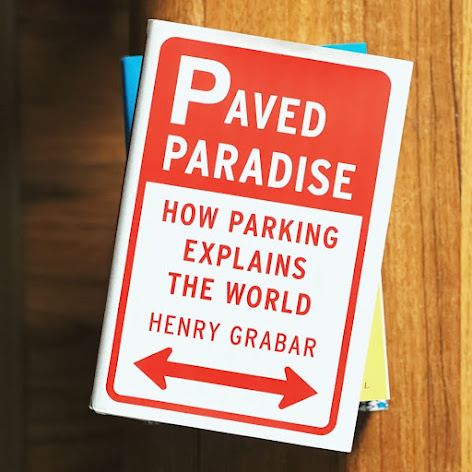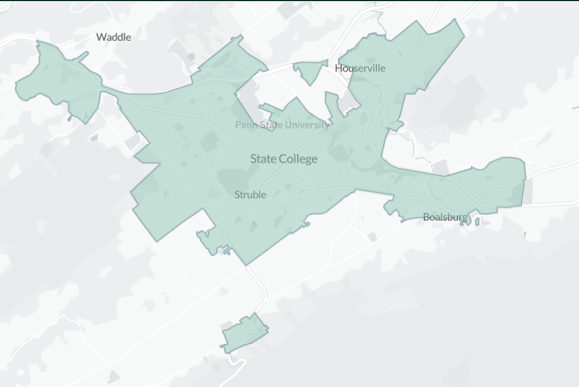Paved Paradise Book Review
Written by Evan Ferstl
Recently, I read the new book Paved Paradise: How Parking Explains the World by Henry Grabar. Given the current discussions around parking in State College, I thought this would be an interesting read and was not disappointed. Here are some of my main takeaways:
There is a massive oversupply of parking in American cities
Grabar makes many arguments familiar to anyone familiar with Strong Towns talking points. American cities have built so many parking spots that it has brought them to ruin. While most parking is free for parkers, it is expensive for cities to maintain, creating a massive subsidy (81). Parking availability is the number one predictor of car use, and greater car use in turn leads to an insatiable demand for more parking (82). Cities and their residents routinely believe incorrectly that they are facing a parking shortage. (85). This last point is particularly interesting because of the discussions we’ve had in our community about this exact problem. While the borough council maintains we have a shortage, some residents at the council meeting regarding the Brewery reported seeing downtown parking garages with lots of spaces open during peak hours. One potential solution to the parking problem is figuring out where the underutilized spaces are and using them more efficiently, so that waste is reduced. Apps have been developed to tell drivers in real time where available parking is and how much it costs, such as SpotHero in Chicago (discussed in ch. 7). I recently heard our transportation commission discuss whether a similar app is viable in State College. Hopefully we can get some traction on that!
Parking brings out the worst in many people
There is something about the nature of parking that turns humans into survivalists, going to shocking lengths to make sure they get their spot. Grabar uses New York as a case study to demonstrate how nasty people can be when it comes to parking. Parking enforcement agents are routinely harassed on the job. To quote Grabar, “one parking officer was assaulted by a priest in his collar; another went to the hospital only to learn his X-ray technician had been the attacker” (35). A UK study showed that 90% of parking agents had experienced violence on the job over a one year span (39). People parked illegally cost cities thousands in unpaid fines and traffic congestion, and the police themselves can be some of the worst offenders (46-49). Furthermore, in chapter 6, Grabar explores the massive corruption in the parking industry, including documenting illegal operations in New York which have cost people their lives. In Chicago, financial hard times after the great recession helped the city council get swindled into selling their parking meters to Morgan Stanley, a move that has greatly benefitted Wall Street but made it so Chicagoans see no financial return on parking revenue. This remarkable story is the subject of chapter 8.
Parking mandates are arbitrary and exacerbate problems
One hot button issue in State College right now is whether to remove our parking mandates. Grabar traces the phenomenon of American parking mandates back to their roots. In the decades following suburban expansion (around 1950-70), cities wanted to entice drivers to their declining downtowns and were afraid that absences of parking were scaring suburbanites off. Therefore, armed with little or no evidence that this would provide the economic boost they needed, cities passed the responsibility of building parking spaces off to developers (66-70). Parking mandates are often a key mechanism in the housing crisis. Grabar gives evidence in chapter 1 of affordable housing developers being sued into oblivion by neighborhoods because their proposed buildings didn’t provide enough parking. This is a way for rich neighborhoods to keep the less fortunate out. He talks later about a pastor who tried to buy property for a neighborhood church in Chicago whose plans were stymied by the city mandating that he buy parking as well. In order to build the church, he had to lease a lot half a mile away which none of his parishioners ever parked at (144).
There is a lot more in the book, and I would encourage you to read it yourself. I will even lend it to you if you reach out! Grabar is a very engaging writer, and you will learn lots about how excessive parking hurts Americans.



I liked this one too, not very dry for a book on parking! If anybody wants to borrow the more data-intensive (but still surprisingly funny) "The High Cost of Free Parking" by Donald Shoup I am happy to lend it. I also have "Spot's Parking Lot", a bit of shameless Shoupist propaganda for kids.
ReplyDeleteIf you want more information on the local parking situation there is a parking study done by the consultants Kimley-Horn in 2019-20. There is lots of hard data about the utilization of the different garages and street parking areas, as well as various recommendations. I am not sure where it's posted now but it looks like you can find it in the 10/2020 TC agenda starting on page 27: https://content.civicplus.com/api/assets/e4993ba9-3890-4c55-a52c-e678443e217b